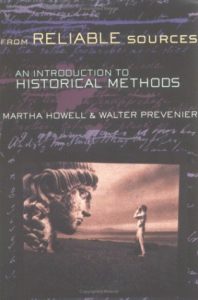 Warning: For new readers only. This post is essentially a repeat of a March 17th post this year. So if you were not paying attention back then . . . .
Warning: For new readers only. This post is essentially a repeat of a March 17th post this year. So if you were not paying attention back then . . . .
Once again a forum post I wrote over a year ago, Rules of Historical Reasoning, has come in for indirect attention from Religion Prof.
When sharing a recent blog post on social media, I offered some thoughts on how academic study works at its most basic level. Here is what I wrote, with some minor improvements and alterations to the wording:
Reading some online discussions, you’d think that there is a need for people on those blogs and discussion boards, with no particular expertise in or professional connection with the study of history, to come up with their own methods for historical study. Not that they don’t talk about what historians and scholars past and present have done and do. But they talk about the methods as though they themselves actually use them regularly to investigate historical questions and so are poised to assess their value, and indeed better poised that professionals who do in fact use them, daily.
The “discussion boards” link is to my forum post. Far from suggesting that my post in any way implied that amateurs do or should “come up with their own methods for historical study” the whole thrust of the post was that academic historians explain and justify the methods that they, as academics, use. And far from suggesting that biblical scholars investigating the question of the historical Jesus “do in fact use” those same methods, the whole thrust of the post was that as a rule biblical scholars addressing the historical Jesus part company with their historian peers in non-biblical fields.
The same criticism of my post was made in mid March this year and I responded at that time with a copy of my forum post. I copy that forum post again here, but preface it with a link to a fuller discussion by a historian of ancient history of some renown, M. I. Finley:
An Ancient Historian on Historical Jesus Studies, — and on Ancient Sources Generally
Rules of Historical Reasoning
From Mark Day, The Philosophy of History, 2008, pp. 20-21.
Continue reading “How Scholarship (especially historical research into almost any topic except the historical Jesus) Works”
